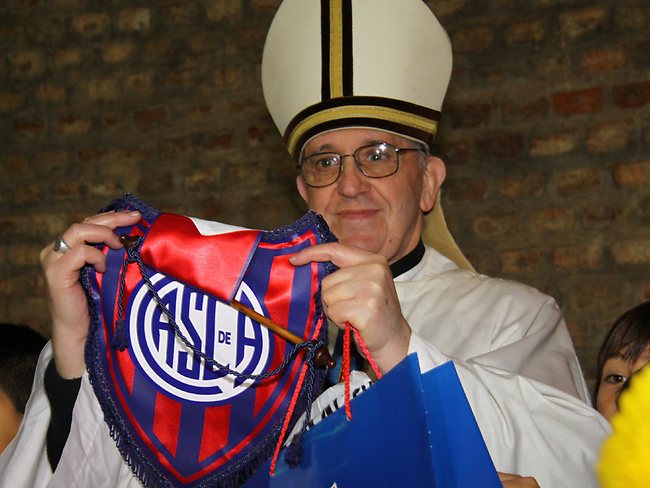Pope Francis and Argentina's 'Dirty War': Accusers say he knew of torture; defenders say he was not a collaborator
THE Vatican has rejected claims that Pope Francis failed to do enough to protect two priests kidnapped and tortured by Argentina's military junta.
THE Vatican has rejected claims that Pope Francis failed to do enough to protect two priests kidnapped and tortured by Argentina's military junta, saying he had in fact helped save lives.
Jorge Mario Bergoglio, the first pope to hail from Latin America, has been criticised by leftist critics for his actions during Argentina's "Dirty War" in which 30,000 people died or disappeared from 1976 to 1983.
His role in the arrest of two young Jesuits, Orlando Yorio and Francisco Jalics, who were taken to a notorious torture centre by the brutal right-wing junta, has come under intense scrutiny.
Vatican spokesman Federico Lombardi on Friday said: "There has never been a credible, concrete accusation against him. The Argentinian justice system ... has never charged him with anything."
He said the campaign against Bergoglio was "well known" but claimed it was defamatory and aimed at discrediting the Church.
Francis and the politics of the papacy.
Pope Francis faces great expectations.
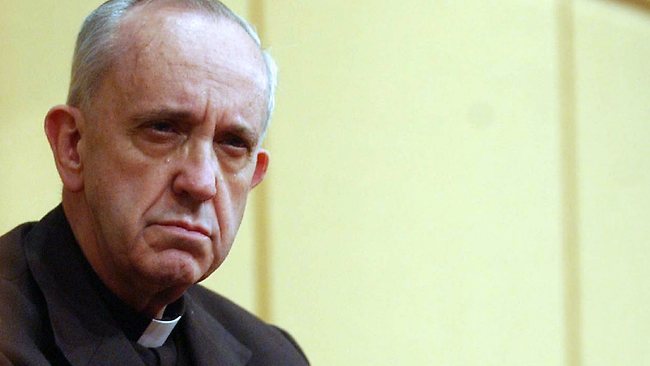
"The accusations come from parts of the anti-clerical left to attack the Church and must be denied," said Mr Lombardi, insisting that Bergoglio "did a lot to protect people during the dictatorship" when he was not yet a bishop.
The new pope's authorised biographer, Sergio Rubin, argues that this was a failure of the Roman Catholic Church in general, and that it's unfair to label Bergoglio, then a thirtysomething leader of Argentina's Jesuits, with the collective guilt that many Argentines of his generation still wrestle with.
"In some way many of us Argentines ended up being accomplices,'' at a time when anyone who spoke out could be targeted, Rubin said in an interview with The Associated Press just before the papal conclave.
Some leading Argentine human rights activists agree that Bergoglio, now 76, doesn't deserve to be lumped together with other church figures who were closely aligned with the dictatorship.
"Perhaps he didn't have the courage of other priests, but he never collaborated with the dictatorship,'' Adolfo Perez Esquivel, who won the 1980 Nobel Peace Prize for documenting the junta's atrocities, said.
"Bergoglio was no accomplice of the dictatorship. He can't be accused of that,'' Perez Esquivel told Radio de la Red in Buenos Aires.
Bergoglio said he had told the priests - Orlando Yorio and Francisco Jalics - to give up their slum work for their own safety, and they refused.
"I warned them to be very careful,'' Bergoglio told Rubin.
"They were too exposed to the paranoia of the witch hunt. Because they stayed in the barrio, Yorio and Jalics were kidnapped.''
Yorio later accused Bergoglio of effectively delivering them to the death squads by declining to publicly endorse their work. Yorio is now dead, and Jalics has refused to discuss those events since moving into a German monastery.
Both priests were eventually dropped off blindfolded in a field after a harrowing helicopter ride, two of the few detainees to have survived that prison.
A common punishment was for opponents of the regime to be blindfolded, taken for a ride in a helicopter, and dropped into the sea, never to be seen again.
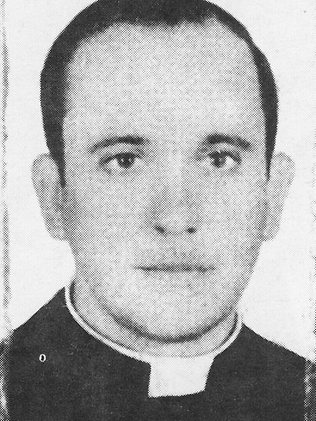
Rubin said Bergoglio only reluctantly told him the rest of the story: that he had gone to extraordinary, behind-the-scenes lengths to save them.
Bergoglio 'saved priest' from dictator
The Jesuit leader persuaded the family priest of feared dictator Jorge Videla to call in sick so that he could say Mass instead. Once inside the junta leader's home, Bergoglio privately appealed for mercy, Rubin wrote.
"Fortunately, a while later they were freed, first because they couldn't accuse them of anything, and second, because we moved like crazy people.
"The very night that I learned of their kidnapping, I began moving'' to save them, Bergoglio recalled.
All this was done in secret, at a time when other church leaders were publicly endorsing the junta and calling on Catholics to restore their "love for country'' despite the terror in the streets.
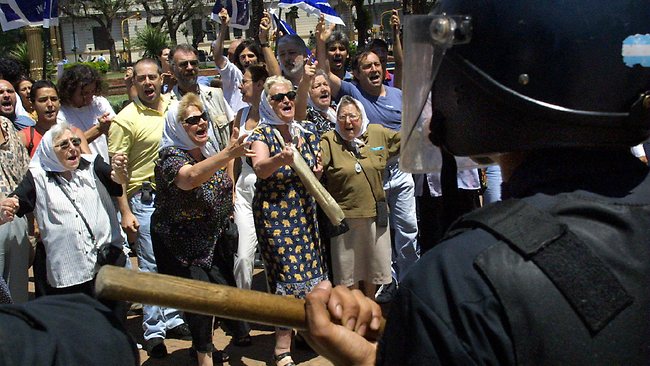
Other members of the slum church who were captured along with the priests were never seen again.
"It's a very sensitive subject,'' Rubin told the AP.
"The Argentine church was one of the most conservative in Latin America. It showed a good disposition toward the military authorities, who, to make matters worse, considered themselves Christians and called themselves good Catholics.''
There were about 50 Argentine bishops at the time, and Bergoglio was somewhere in the middle politically, Rubin suggested.
"There were some who were in it up to their necks,'' he said, citing Christian Federico von Wernich, who served as a police chaplain then and is now serving a life sentence for torture and kidnapping.
"There were those who risked it all to openly challenge the junta, and some of those ended up dead,'' Rubin added, among them Bishop Enrique Angelelli who was killed in a suspicious traffic accident in 1976 while carrying evidence about two murdered priests.
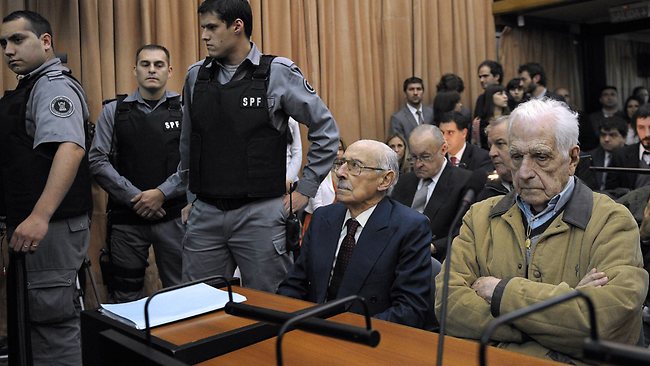
Bergoglio himself has always denied any involvement in the case, and even says he intervened with the head of the junta, Jorge Videla, to beg for them to be freed. The two men were released after five months.
But others say Bergoglio's rise through the Argentine church since then has put him in many positions of power where he could have done more to atone for the sins of Catholic officials who did actively conspire with the dictators.
Some priests even worked inside torture centers, and blessed those doing the killing.
And now that Argentina is actively putting former dictatorship figures on trial for human rights violations, they say he's been more concerned about preserving the church's image than providing evidence that could lead to convictions.
"There's hypocrisy here when it comes to the church's conduct, and with Bergoglio in particular,'' said Estela de la Cuadra, whose family lost five members during the junta years and whose mother co-founded the Grandmothers of the Plaza de Mayo activist group to search for missing people.
"There are trials of all kinds now, and Bergoglio systematically refuses to support them.''
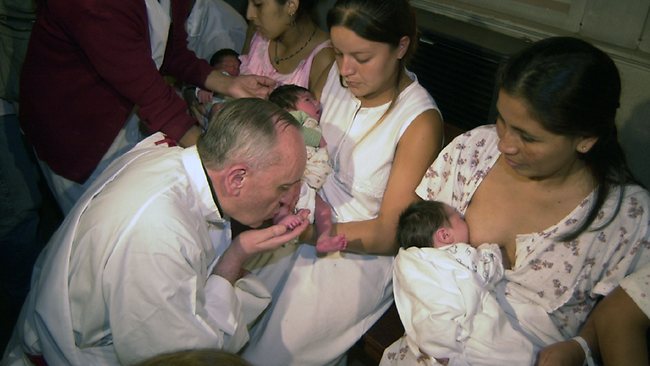
Bergoglio twice invoked his right under Argentine law to refuse to appear in open court in trials involving torture and murder inside the feared Navy Mechanics School and the theft of babies from detainees.
When he eventually did testify in 2010, his answers were evasive, human rights attorney Myriam Bregman told the AP.
Bergoglio's own statements proved church officials knew from early on that the junta was torturing and killing its citizens even as the church publicly endorsed the dictators, she said.
"The dictatorship could not have operated this way without this key support,'' she said.
The newly-elected pontiff, who is also the first Jesuit pope, earlier urged the troubled Catholic Church that he has inherited not to succumb to "pessimism" and to find new ways of spreading the faith.
"Let us not give in to pessimism, to that bitterness that the devil offers us every day," he told an audience of the world's cardinals on his third day in office.
In a reference to the declining number of worshippers in many parts of the world, he urged the cardinals to find "the courage to persevere and also to find new ways to bring evangelisation to the ends of the earth".
Francis, 76, said he and they were "elderly", but old age brought wisdom.
"Let us give this wisdom to young people like good wine that gets better over the years," he told the cardinals.
Francis hailed his predecessor Benedict XVI's historic resignation as a "courageous and humble act".
Benedict, who last month became the first pope to stand down for 700 years, had "lit a flame in the depth of our hearts that will continue to burn", he said.
Francis wore white papal vestments but also plain black shoes, not the red shoes favoured by his German predecessor, for the address in the ornate 16th-century Clementine Hall in the Apostolic Palace at the Vatican.
He has signalled he will lead a more simple papacy, stripped of the fineries enjoyed by his predecessors.
On Thursday, he gave a stark warning that the Church, wracked by scandal and Vatican infighting, risked becoming just another charitable organisation if it strayed from its true mission.
His inauguration mass will take place on Tuesday - a significant date in the Catholic calendar because it is the Feast of St Joseph, the patron saint of the universal church.
The new pontiff is also due to meet his predecessor, who has withdrawn to the papal summer residence in Castel Gandolfo, in the coming days.
The surprise election of the son of an Italian emigrant railway worker, who was considered a rank outsider before the cardinals began their confidential deliberations, has sparked hope for change in the Church.
His elevation is being seen as a nod to the Church's power in Latin America, which is home to 40 per cent of the world's Catholics. In Europe, its traditional power base, it is ageing and declining.
Projecting an image as a simple man of the people, the pope chose to name himself after St Francis of Assisi, the 13th century saint who shunned the riches of his family to devote himself to God and the poor.
As archbishop of Buenos Aires, he lived in a modest apartment rather than the official residence, and he has already made his mark in Rome with his informal style.
The Vatican revealed that following his election Francis had chosen to ride in a minibus with his fellow cardinals rather than the papal limousine. He also returned to his lodgings to pay his own bill.
With health always an issue surrounding new popes - John Paul I only lived for just 33 days after he was elected in 1978 - the Vatican confirmed that Francis had part of a lung removed as a boy, but insisted that he is in good health.
The pope faces the challenge of stamping his authority on the Vatican machinery and trying to bring back people in the West who are turning their back on Catholicism.
He must also confront the continuing fallout from the sexual abuse of children by paedophile priests stretching back decades.


